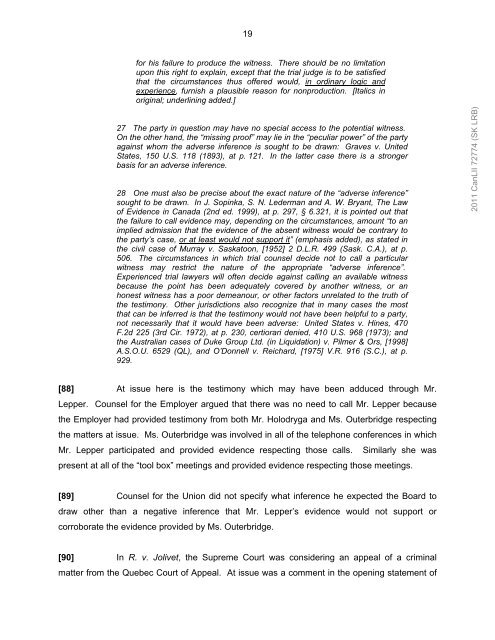FAQ's Cases - Stewart McKelvey
FAQ's Cases - Stewart McKelvey
FAQ's Cases - Stewart McKelvey
- No tags were found...
Create successful ePaper yourself
Turn your PDF publications into a flip-book with our unique Google optimized e-Paper software.
19for his failure to produce the witness. There should be no limitationupon this right to explain, except that the trial judge is to be satisfiedthat the circumstances thus offered would, in ordinary logic andexperience, furnish a plausible reason for nonproduction. [Italics inoriginal; underlining added.]27 The party in question may have no special access to the potential witness.On the other hand, the “missing proof” may lie in the “peculiar power” of the partyagainst whom the adverse inference is sought to be drawn: Graves v. UnitedStates, 150 U.S. 118 (1893), at p. 121. In the latter case there is a strongerbasis for an adverse inference.28 One must also be precise about the exact nature of the “adverse inference”sought to be drawn. In J. Sopinka, S. N. Lederman and A. W. Bryant, The Lawof Evidence in Canada (2nd ed. 1999), at p. 297, § 6.321, it is pointed out thatthe failure to call evidence may, depending on the circumstances, amount “to animplied admission that the evidence of the absent witness would be contrary tothe party’s case, or at least would not support it” (emphasis added), as stated inthe civil case of Murray v. Saskatoon, [1952] 2 D.L.R. 499 (Sask. C.A.), at p.506. The circumstances in which trial counsel decide not to call a particularwitness may restrict the nature of the appropriate “adverse inference”.Experienced trial lawyers will often decide against calling an available witnessbecause the point has been adequately covered by another witness, or anhonest witness has a poor demeanour, or other factors unrelated to the truth ofthe testimony. Other jurisdictions also recognize that in many cases the mostthat can be inferred is that the testimony would not have been helpful to a party,not necessarily that it would have been adverse: United States v. Hines, 470F.2d 225 (3rd Cir. 1972), at p. 230, certiorari denied, 410 U.S. 968 (1973); andthe Australian cases of Duke Group Ltd. (in Liquidation) v. Pilmer & Ors, [1998]A.S.O.U. 6529 (QL), and O’Donnell v. Reichard, [1975] V.R. 916 (S.C.), at p.929.2011 CanLII 72774 (SK LRB)[88] At issue here is the testimony which may have been adduced through Mr.Lepper. Counsel for the Employer argued that there was no need to call Mr. Lepper becausethe Employer had provided testimony from both Mr. Holodryga and Ms. Outerbridge respectingthe matters at issue. Ms. Outerbridge was involved in all of the telephone conferences in whichMr. Lepper participated and provided evidence respecting those calls. Similarly she waspresent at all of the “tool box” meetings and provided evidence respecting those meetings.[89] Counsel for the Union did not specify what inference he expected the Board todraw other than a negative inference that Mr. Lepper’s evidence would not support orcorroborate the evidence provided by Ms. Outerbridge.[90] In R. v. Jolivet, the Supreme Court was considering an appeal of a criminalmatter from the Quebec Court of Appeal. At issue was a comment in the opening statement of
















